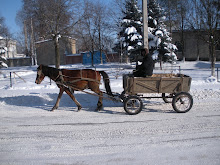There are so many religious holidays in my host country, that most of the time, no one really mentions them. Except of course, on the big ones, and St. Maria Day (because people bring my host mother roses from their garden in honor of her namesake). On these days, Moldovans can show respect by not washing, working, or eating meat. I have a few colleagues whose host families take this so far as to mean, no knitting. Even if it’s for recreation. But most often, the days are just like any other in my town. Back when I was in my training village, my host mother was much more likely to go to church on these days or observe the respective rituals.
In 2000, the religious make up of Moldova consisted of 98% Eastern Orthodox, 1.5% Jewish, and 0.5% Baptist (meaning all variations of Protestant). In fact, in the city just north of my town, there is a substantial congregation of Mormons as well.
I mention religion as an introduction to a discussion about winter holidays in Moldova. In a western style supermarket (in the capital city) I saw a few Christmas decorations, but that is all of the commercial hoopla I have seen thus far. I have not heard “jingle bells” or “silent night” once, not indulged in a gingerbread latte, or helped Mom put up the Christmas decorations (but I guess that means I don’t have to help take them down!). I don’t pretend to make any assertions as to whether this is good or bad, it just simply is.
Just last week, Moldova declared December 25 to be a “non-working day.” But this is a new and western shift in Moldovan culture. Following the Orthodox (“Old”) Calendar, means that Christmas is celebrated on January 7, and New Years on January 14.
New Years is something Moldova started celebrating on January 1 quite some time ago. I know for a fact, because I have seen the pictures, the youth in my town celebrate by building a bon fire from old tires on December 31. Wish me luck trying to open minds about this one! My host mother was also very sweet when she tried “educating” me about her family’s New Year’s tradition: champagne at midnight. “It’s very special,” she said.
There is a difference between our two customs worth noting for those who really do enjoy “jingle bells” and “frosty the snowman.” Caroling is really important during the winter, but it is done for the New Year, not Christmas. The youth I work with depend on this activity every year to raise money for the organization. They carol at the local intuitions and private homes, collecting money to sustain them through the next year.
The take away from what I learned to date, is that winter holidays in Moldova share a central theme. Both cultures place a heavy emphasis on spending time with family. Be it with special meals, events, or times of worship. Though I have to laugh, because my host aunt says those American families are just far too small!
Subscribe to:
Post Comments (Atom)




























No comments:
Post a Comment